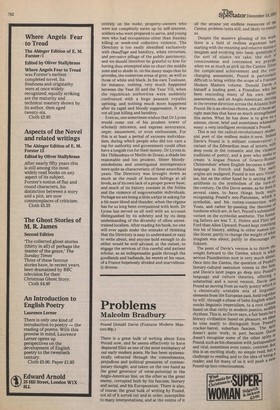Problems
Malcolm Bradbury
Pound Donald Davie (Fontana Modern Masters 60p.) There is a great bulk of writing about Ezra Pound now, and he seems effectively to have displaced Eliot as one of the most exemplary of our early modern poets. He has been systematically refracted through the commitments,
• prejudices and political pressures of contemporary thought, and taken on the one hand as the great generator of verse-potential in the Anglo-American line, on the other as the great enemy, corrupted both by his fascism, literary and social, and his Europeanism. There is also, of course, the great bulk of writing by Pound, not all of it sorted out and in order, susceptible to many interpretations, and at the centre of it all the arcane yet endless resources of the Cantos, problem-texts still, and likely to remain so.
Despite the massive glossing of his work there is a field of endless argument her starting with the meaning and relative status of imagism and evolving into basic questions of the sort of stance we take, the sort ni consciousness and concession we provide' when we as much as pick up the Cantos. Given the complicated achievement and the ever. changing assessment, Pound is particularlY difficult to bring within the scope of a Fontana Modern Masters volume. Donald Davie iS himself a leading poet, a Poundian who has been rescinding many of his own earlier assessments, and an Anglo-American, moving in the reverse direction across the Atlantic fro" Pound. He is an obvious choice, one of those ap,t right matches that have so much strengthenee this series. What he has done is to give us al solemn, clever, brief and sometimes whim'ca essay: a very intelligent revisionist's Pound. This is not the radical-revolutionary model,," nist poet of the endless make-it-new. Indoe" Davie's Pound is 'a militant conservative', a variant of the Edwardian man of letters, Witil, deep roots in the romantic and the classia traditions of poetry, and a poet who seeks t° create 'a lingua franca of Graeco-Roman Christendom' where English becomes a sistet language to French and Italian. The ear':' origins are realigned; Pound is not anti-Victor" ian, but on the other hand he is setting up antithesis to the symbolism of the turn-d,',, the-century. On this Davie seems, as he does' several cases, to have things both waYs.', recognising Pound's neo-Platonism, vvhich symbolist, and his vortex-connection Wit, Yeats, and rather by-passing the theories °,' hardness which are, in fact, Pound's substantial variant on the symbolist aesthetic. The found; ing fathers are less T. E. Hulme and Flint an' Ford than Allen Upward; Pound kept rewriting this bit of history, adding in other names ton't like Storer, partly to change the weight of \Oa imagism was about, partly to discourage the folklore.
The point of Davie's version is to throw tat weight forward to the Cantos, which is villa serious Poundianism now is very much about. Once into the Cantos, the question of Pound s literary-cultural saeculum comes to the fia,lee's and Davie's later pages go deep into Poun% language and culture theories, offering s substantial and a novel version. Daviesee,s Pound as moving from an early poetry which tc 'a chronically unstable mix of linguistlt elements from the European past, held togotheb by will', through a phase of babu English elle mocks linguistic imperialism, to a root sYstelli,e based on that rarity in modern poetics, audibl rhythms. This is, as Davie says, a fair basis for al literary civilisation based on pleasure, an 15 he tries neatly to distinguish fromPounu.t cracker-barrel, suburban fascism. The sPhe doesn't quite work; in part because Das.1 doesn't recognise some of the other splits Inn Pound, such as his obsession with juxtapositi° and vital, sometimes even comic, contrast. But; this is an exciting study, no simple read, but „ challenge to reading and to the idea of being reader; and for many of us it will push a new Pound up into consciousness.

































 Previous page
Previous page